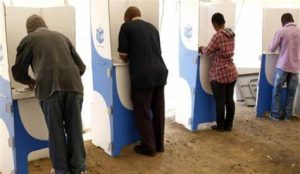
Staff Writer
With the IEC declaring the results of the November 2021 South African poll as free and fair, much can be interpreted from voting behaviour and its consequences. Around 12 million had voted, a large drop from the 2016 poll, which saw a turnout of 58%. Further, around a third of municipalities were hung, meaning that coalitions are required, failing which bi-elections will have to be organised. The ANC is still the largest party, capturing 161 municipalities, while the EFF, despite receiving around 11% of the vote did not win outright in any municipality; the DA’s share fell to 13%, and its vote count fell by over 5%, with the IFP gaining many municipalities, especially in KwaZulu Natal%.
Speaking to Radio Islam International, Oscar Van Heerden, Senior Fellow at the Mapungubwe Institute for Strategic Reflections, noted the low turnout, and the fact that this was most acutely felt by the ruling ANC. He further wondered whether or not the ANC would receive the message, lamenting the lack of change since 2016, which was supposed to have been the party’s big moment of introspection, “one would have thought that 20 16 [would have been] the warning shot across the bow, when the ANC lost some of the metros; one would have thought that’s when they should have realized that they should shape up and try and deliver a better service to the citizens out there. But clearly, that is not what happened. And as a result, people are seeing corruption still continuing [and] service delivery at its weakest.” Van Heerden noted how this played into the lack of voter turnout as citizens began believing that change would be better achieved through other means.
In relation to the elections process itself and its unprecedent results, Van Heerden noted the large “bouquet” of political parties voted in by the electorate, cautioning that this may impede the nation building process. This was especially since parties such as the Coloured Congress and Patriotic Alliance, and the Christian and Muslim parties at times espouse a more narrow, identity based, political outlook and ideology, which may highlight differences instead of finding commonalities. Last, Van Heerden alluded to the performance of the Democratic Alliance, which lost outright control of many municipalities in the Western Cape.







0 Comments